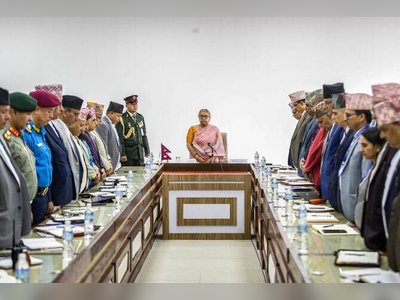
Germany Bans Muslim Group Accused of Antisemitism and Threatening Democratic Values
The German government has banned a Muslim group, accusing it of promoting antisemitism, discriminating against women and sexual minorities, and threatening the country's constitutional order.
BERLIN: The German government on Wednesday banned a Muslim group, Muslim Interaktiv, accusing it of violating human rights and the country’s democratic values.
Additionally, authorities conducted raids against two other Muslim groups across the nation.
The Interior Ministry stated that Muslim Interaktiv represented a threat to Germany's constitutional order by promoting antisemitism and discriminating against women and sexual minorities.
Muslim Interaktiv is known for its active online presence, which particularly appeals to young Muslims who may feel alienated or discriminated against in Germany’s predominantly Christian society.
The German government argued that the group posed a significant threat as it promoted Islam as the sole model for social order and advocated for Islamic law to take precedence over German law within Muslim communities.
In recent years, the German government has been taking stronger action against extremism, banning several far-right and Muslim organizations.
This crackdown follows a series of attacks, both by Muslim extremists and far-right groups plotting to undermine the country’s democratic order.
The Interior Minister, Alexander Dobrindt, emphasized that the government would enforce the law against any group promoting hatred towards Israel and Jews, attacking women's rights and minority rights.
Investigations are currently underway against two other Muslim groups, Generation Islam and Reality Islam.
The Ministry stated that these organizations are opposed to gender equality and freedom of sexual orientation and gender identity, expressing an intolerance incompatible with democracy and human rights.
Authorities conducted searches in multiple premises across Hamburg, Berlin, and Hesse in connection with the investigations.
The Interior state minister of Hamburg, Andy Grote, praised the ban, calling it a blow against 'modern TikTok Islamism.' The group was particularly active in Hamburg.
In a recent report by Hamburg's domestic intelligence service, it was noted that Muslim Interaktiv addressed socially relevant topics in their online posts and videos to exploit the supposed rejection of politics and society towards the entire Muslim community in Germany.
Ahmad Mansour, an activist against Muslim extremism, supported the ban on Muslim Interaktiv, describing the group as part of an Islamist network that had become increasingly aggressive.
He highlighted the group's efforts to indoctrinate young people with Islamist ideology.
As of Wednesday morning, Muslim Interaktiv’s online presence appeared to have been taken down, and attempts to reach the group for comment were unsuccessful.
Additionally, authorities conducted raids against two other Muslim groups across the nation.
The Interior Ministry stated that Muslim Interaktiv represented a threat to Germany's constitutional order by promoting antisemitism and discriminating against women and sexual minorities.
Muslim Interaktiv is known for its active online presence, which particularly appeals to young Muslims who may feel alienated or discriminated against in Germany’s predominantly Christian society.
The German government argued that the group posed a significant threat as it promoted Islam as the sole model for social order and advocated for Islamic law to take precedence over German law within Muslim communities.
In recent years, the German government has been taking stronger action against extremism, banning several far-right and Muslim organizations.
This crackdown follows a series of attacks, both by Muslim extremists and far-right groups plotting to undermine the country’s democratic order.
The Interior Minister, Alexander Dobrindt, emphasized that the government would enforce the law against any group promoting hatred towards Israel and Jews, attacking women's rights and minority rights.
Investigations are currently underway against two other Muslim groups, Generation Islam and Reality Islam.
The Ministry stated that these organizations are opposed to gender equality and freedom of sexual orientation and gender identity, expressing an intolerance incompatible with democracy and human rights.
Authorities conducted searches in multiple premises across Hamburg, Berlin, and Hesse in connection with the investigations.
The Interior state minister of Hamburg, Andy Grote, praised the ban, calling it a blow against 'modern TikTok Islamism.' The group was particularly active in Hamburg.
In a recent report by Hamburg's domestic intelligence service, it was noted that Muslim Interaktiv addressed socially relevant topics in their online posts and videos to exploit the supposed rejection of politics and society towards the entire Muslim community in Germany.
Ahmad Mansour, an activist against Muslim extremism, supported the ban on Muslim Interaktiv, describing the group as part of an Islamist network that had become increasingly aggressive.
He highlighted the group's efforts to indoctrinate young people with Islamist ideology.
As of Wednesday morning, Muslim Interaktiv’s online presence appeared to have been taken down, and attempts to reach the group for comment were unsuccessful.










